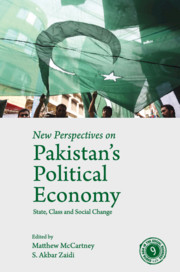Book contents
- Frontmatter
- Contents
- Preface
- Introduction
- 1 In a Desperate State: The Social Sciences and the Overdeveloped State in Pakistan, 1950 to 1983
- 2 The Overdeveloped Alavian Legacy
- 3 Institutions Matter: The State, the Military and Social Class
- 4 Class Is Dead but Faith Never Dies: Women, Islam and Pakistan
- 5 The Amnesia of Genesis
- 6 The Political Economy of Uneven State-Spatiality in Pakistan: The Interplay of Space, Class and Institutions
- 7 An Evolving Class Structure? Pakistan's Ruling Classes and the Implications for Pakistan's Political Economy
- 8 The Segmented ‘Rural Elite’: Agrarian Transformation and Rural Politics in Pakistani Punjab
- 9 Ascending the Power Structure: Bazaar Traders in Urban Punjab
- 10 Democracy and Patronage in Pakistan
- 11 From Overdeveloped State to Praetorian Pakistan: Tracing the Media's Transformations
- About the Contributors
- Index
7 - An Evolving Class Structure? Pakistan's Ruling Classes and the Implications for Pakistan's Political Economy
Published online by Cambridge University Press: 26 April 2019
- Frontmatter
- Contents
- Preface
- Introduction
- 1 In a Desperate State: The Social Sciences and the Overdeveloped State in Pakistan, 1950 to 1983
- 2 The Overdeveloped Alavian Legacy
- 3 Institutions Matter: The State, the Military and Social Class
- 4 Class Is Dead but Faith Never Dies: Women, Islam and Pakistan
- 5 The Amnesia of Genesis
- 6 The Political Economy of Uneven State-Spatiality in Pakistan: The Interplay of Space, Class and Institutions
- 7 An Evolving Class Structure? Pakistan's Ruling Classes and the Implications for Pakistan's Political Economy
- 8 The Segmented ‘Rural Elite’: Agrarian Transformation and Rural Politics in Pakistani Punjab
- 9 Ascending the Power Structure: Bazaar Traders in Urban Punjab
- 10 Democracy and Patronage in Pakistan
- 11 From Overdeveloped State to Praetorian Pakistan: Tracing the Media's Transformations
- About the Contributors
- Index
Summary
It has been argued that Pakistan's class structure has been reconfigured over the past fifty years as the middle classes have become increasingly powerful and adept in their demands for political representation, government services and the redistribution of national wealth. Pakistan's class structure has indeed shifted significantly away ‘from a largely agricultural, rural economy, where ‘feudals’ dominate the economic, social, and particularly political space’ (Zaidi 2017), to one that has a large urban population and a small but highly visible upper-middle class. Zaidi (2014:51) has argued that Pakistan is ‘a long way from the classical structuralist or even Marxist formulation of the Pakistani state dominated by landlords, industrialists, and the metropolitan bourgeoisie’. Yet recent ethnography (Martin 2015; Armytage forthcoming) demonstrates that the configuration of power in Pakistan is not such a long way from these formulations as may initially be supposed. This chapter argues that though Pakistan's class structure has undoubtedly changed, its ruling classes – which I define specifically as the economic and political 1 per cent – have retained their hold on political and economic resources very successfully.
This chapter begins where much of the academic discourse on the location of power in Pakistan begins, by revisiting the foundational work of the influential sociologist Hamza Alavi on the relationship between the state and the ruling classes within the postcolonial nation. I then examine more recent scholarship that reconfigures Alavi's conception of this relationship. This oeuvre of scholarship poses an interesting challenge, but one that is usually peripheral to scholars of political economy: As Pakistan's class structure has evolved, how have the ruling classes, and their position of dominance in Pakistani society, changed? And further, what are the implications for Pakistan's political economy? Focusing first on the theoretical aspects of this challenge, the chapter then draws on ethnographic research conducted by the author between 2013 and 2015 to examine the shifting composition of the ruling classes and the implications for economic inequality and social mobility in Pakistan today.
Alavi concentrated his analysis of power within the postcolonial state on the state ‘oligarchy’ and the ‘ruling classes’, describing a structure of interlinking institutional power blocs, dominated by powerful members.
- Type
- Chapter
- Information
- New Perspectives on Pakistan's Political EconomyState, Class and Social Change, pp. 153 - 175Publisher: Cambridge University PressPrint publication year: 2019
- 1
- Cited by



